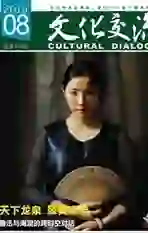传统山水画的电影表达
2019-08-23石丛珊严粒粒
石丛珊?严粒粒
杭州小伙导演的新作走进戛纳
2019戛纳电影节第58届“影评人周”单元,一位杭州富阳人导演的电影《春江水暖》从全球1050部长片中脱颖而出,作为闭幕影片在世界首映。
《春江水暖》以杭州富春江畔为背景,講述了一个普通的三代家庭在日常生活中所经历的人情冷暖。
影评人周主席夏尔·泰松这样评价:“这是一部真正让人一见倾心的作品!这部电影具有宽广、庄严的温柔和叙事性的结构,是对中国传统山水画气韵生动的电影化表达。”
从服装设计到电影导演
“影评人周”,是戛纳国际电影节于1962年创办的平行单元之一,旨在精心呈现全球新锐导演的作品,贝纳尔多·贝托鲁奇、让·尤斯塔奇、奥塔·埃索里亚尼、王家卫等当今世界不少优秀的电影大师都是从这个单元起步的。《春江水暖》是“影评人周”单元创立以来首部获选为闭幕影片的华语电影。
知名影评人Wendy Ide称赞说:“如果将它和杨德昌的作品比较,该导演可视作新华语电影的天才。”
而这位“天才”——1988年出生的导演顾晓刚,并不是科班出身。
一个电影“门外汉”,从服装设计与营销专业出发,走上戛纳红毯,站到了世界影坛的舞台中央——这故事听起来就很像电影。
时间倒退11年。2008年,顾晓刚考入浙江理工大学,机缘巧合之下就读了服装设计与营销专业。浙江理工大学教师李一是顾晓刚当年的辅导员,在李一的回忆中,顾晓刚是个安静却不安分的学生:“他很沉稳,但是骨子里却很有自己的想法,认定的东西会一直坚持下去。”
进校没多久,李一建议顾晓刚报名参加当时的一个创业项目——杭州市赛伯乐杯创业大赛,并协助他组建了一支队伍参赛。在团队成员的共同努力下,项目一路披荆斩棘,最后竟然打进了全国36强,拿到了二等奖,杭州市政府当年就给了10万创业启动基金。
让李一印象深刻的是,当年比赛时,顾晓刚团队就在答辩环节作了视频展示:“那时候视频展示还很少见,其他团队基本上是PPT展示,唯独他们做了视频,让评委们眼前一亮。”
事实上,顾晓刚从大二开始,就慢慢“玩”起了电影。他向学校动画班同学借DV,摸索着拍电影,甚至当时专业课的期末汇报,他也会用视频的方式交作业。大学期间,他参加各种影展,被杭州亚洲青年影展选入训练营。在训练营里,顾晓刚逐渐打下了制作纪录片的基本功。
顾晓刚的本科同学,当年和他一同参加竞赛的尹璐评价:“顾晓刚是一个异常专注、心思细腻的人,他从大学起就喜欢捣鼓视频剪辑,当时大家都觉得他拍视频纯粹是业余爱好。没想到,这是他电影人生涯的开端。”
毕业期间,顾晓刚再次展露出他在影视艺术上的非凡天赋。2013,他的毕业作品《无的念头》无印良品概念广告,在第20届北京大学生电影节第14届大学生原创影片大赛上获得大赛MOFILM商业短片类二等奖。
从就读服装设计营销专业,到致力于成为独立的电影人,这对任何人而言,都需要莫大的勇气。“在人生道路的抉择上,在现实与梦想之间,我选择了梦想。”顾晓刚说。
他抱起老师转了四圈
谈到自己的学生时代,顾晓刚说,自己最要感谢的人,是浙江理工大学服装学院的教师姚琛。
“姚琛老师不仅是我的专业导师,还是我成长的引路人。她常在为人处世方面让给我启发和指导,让我不断思考和自省。她当时推荐我的几本书,比如《水知道答案》《吸引力法则》《牧羊少年奇幻之旅》,至今对我仍有很大影响。艺术工作本质上就是探讨人与世界、人与社会、人与自身的关系。只有知行合一的体会,才能创作出打动别人的作品。”
彼时,姚琛刚刚成立了自己的工作室,顾晓刚成为第一批进入工作室实训的学生之一。
姚琛评价顾晓刚是“这样一个年龄段学生当中不多见的,对自我生命有内在追求的既努力又坚韧的孩子。很多人在追梦的过程中放弃了,顾晓刚不会。所以,当他开始跟我说要做电影的时候,我是他身边为数不多的对他绝对支持的人。”
作为师长,姚琛经常和顾晓刚一起,探讨人生哲学、传统文化等话题。顾晓刚坦言,这样的思想启蒙,在潜移默化之中铺就了自己导演艺术的思想基石和精神灵感。当时,工作室决定自费送学生到外面培训。顾晓刚成了工作室第一个送出去培训的学生。姚琛回忆,因为觉得培训的内容对自己非常有帮助,回来以后,当时个头瘦小的顾晓刚竟然“激动地抱着她原地转了四圈”!
这一幕,至今让姚琛记忆犹新。
“晓刚也是一个感恩、善良的孩子,每次他有新成绩,都会第一时间与我分享,平时也会经常向我问候。我们现在已经不光是师生,更像彼此欣赏的心灵知己。”对于顾晓刚的成长,姚琛也感叹,“虽然他从没有跟我抱怨过什么,但我知道他这一路走来,很辛苦。能有今天的成绩,我很欣慰,晓刚在沉淀了几年之后,终于发出了自己的光芒!”
镜头里的富春江四季
对于自己成功的秘诀,顾晓刚坦言,还是得益于“一万小时定律”。顾晓刚说,自己从2011年进入这个行业开始学习,到今年,差不多已经10年了。拍摄《春江水暖》,从2016年开始写剧本,一直拍到2019年3月,也是三年磨一剑。
为了能够呈现富春江畔山水草木在时间之中的真实变化,顾晓刚选择了按照真实季节来拍摄的方式创作这部电影,这一创作方式的直接考验,是创作团队不得不面对资金紧张的巨大压力。
一部耗资上百万元的片子,对一个毕业不久、家庭条件并不宽裕的学生而言,无异于天文数字。
创作初期,顾晓刚曾经被迫要借助贷款的方式来维持拍摄工作。甚至于,他经常参加各种影展,不光是为了学习,也是为了“以片养片”,拿获奖片子的奖金来继续支撑自己的影片投入。
“拍片有时候就像打仗,现场有的时候就像战场,大家需要一种凝聚力和安定感。作为导演,关键时刻需要给团队一种克服万难的信念。”顾晓刚说。
同时,顾晓刚也对自己的学弟学妹们说,在大学期间找到发自内心的自己真正感兴趣的事情,挺重要的。
“真正步入社会,很多事情会有局限性。大学提供了一个开放、自由的空间和时间,让你可以从内心出发,寻找并发现自己适合、擅长的领域。所以大学期间,一定要多尝试一些事物,找到自己热爱的东西,加以时间的打磨和正确的方法,就能让你走得更遠,从而使自己整个人生都能得到滋养。”
现在,面对赞誉,顾晓刚保持着清醒的头脑。他坦言,路才刚刚开始。目前,团队正在着力进行《春江水暖》的后期宣传。今年12月,《春江水暖》将在巴黎公映,年底会在国内各大院线上映。
顾晓刚计划创作一部名为《千里江东图》的三部曲长卷电影,此次面世的《春江水暖》是三部曲的首部作品。他深信,作品代表一切,“未来,不管舞台多大,走得多远,还是要保持一颗初心。”
Four Seasons of the Fuchun Mountains Enchants Cannes
By Shi Congshan, Yan Lili
First-time director Gu Xiaogangs Dwelling in the Fuchun Mountains stood out from the 1,050 feature films competing for global exposure and became the closing film for International Critics Week at the 72nd edition of the Festival de Cannes from May 14-25, 2019.
Dwelling in the Fuchun Mountains is Gus second feature film, telling a story of four brothers taking care of their mother after her stroke and facing tests of life. The story unfolds over the course of the four seasons, as it would in an ancient Chinese scroll painting. Conceived as the first opus of a trilogy, the film is rated by Charles Tesson, Chair of International Critics Week as an engaging piece that triggers love at first sight and an outstanding production with vast, solemn softness and a wonderful narrative structure cinematically interpreted through a traditional Chinese, poetic rhythm.
Launched in 1962, the festivals International Critics Week section presents a very selective programming of only seven feature films and seven short films in Cannes, and has brought a galaxy of the worlds greatest filmmakers into the spotlight of the most exciting stage, such as Bernardo Bertolucci, Jean Eustache, Otar Losseliani and Karwai Wong. The 2019 International Critics Week welcomes first or second features and boasts a number of debuts which will be eligible for the Camera dOr in 2019. Dwelling in the Fuchun Mountains is the first Chinese film selected as the closing film for the section since 1962, and was lauded by famous movie critic Wendy Ide as a genius piece on a par with the representative works by Edward Yang, one of the most recognized of Taiwans “New Wave” directors.
The story of Gu Xiaogang, who majored in fashion design and marketing at the Hangzhou-based Zhejiang Sci-Tech University, is a drama that would make a wonderful feature film.
“As far as I can recall, he was quiet, but obviously discontented with his lot,” recalls Gus former teacher Li Yi.
“He is not a talker; he is a doer, setting a goal and sticking with it till it becomes reality,” Li adds. In his freshman year, Gu Xiaogang joined a team to take part in a city-level entrepreneurial competition in Hangzhou. The team blazed a trail against formidable rivals and made it into the “top 36” legion, winning a second prize that brought in an initial funding of 100,000 yuan from the city government. The most impressive part of the project was the video presentation in the “oral defense” section, at a time when most of the other participants used PPT.
Gu Xiaogangs passion in video art led him into the cinematic world in his second year at college. He mustered all resources and taught himself to make short films, leaving his mark in all kinds of film festivals. He later joined the training camp of the Hangzhou Asian Film Festival (HAFF), where he further honed his documentary-making skills.
“He is focused, extremely particular about details, although at that time we did not realize how seriously he took filmmaking and that was actually the starting of his career as a professional filmmaker.”
Gus innate talent was fully displayed in his graduation work, a conceptual project made in 2013 to advertise the business ideals of MUJI. The mini-film won a second award from the “Original Films (Commercials) by College Students” section at the 20th Beijing College Student Film Festival (BCSFF).
It took Gu more courage than one can imagine to steer away from fashion design to take film-making. “Between reality and ream, I chose the latter,” Gu summarizes. “I owe a lot to my former teacher and mentor Yao Chen, who inspired me in whatever I chose to do. She not only trained me into a filmmaker but also made me an independent thinker and a better person.”
The scriptwriting for Dwelling in the Fuchun Mountains started in 2016. The film was finished in March, 2019. The team risked enormous financial pressure in order to follow the “four seasons” structural theme and visual principle. In those three years, Gu Xiaogang, fresh from college and penniless, had to take part in all sorts of film competitions just to pay his debts and endless bills generated from the time-consuming shooting process.
“I tried my best to give everyone in the team the confidence and faith, no matter what kind of situation we had to face. We took it as a war in which we had no choice but to win.”
“My filmmaking adventure is beginning,” says Gu. Everyone on his team is putting forth effort for the preparation work prior to the official release of the film in Paris and all over China scheduled for December of this year.
